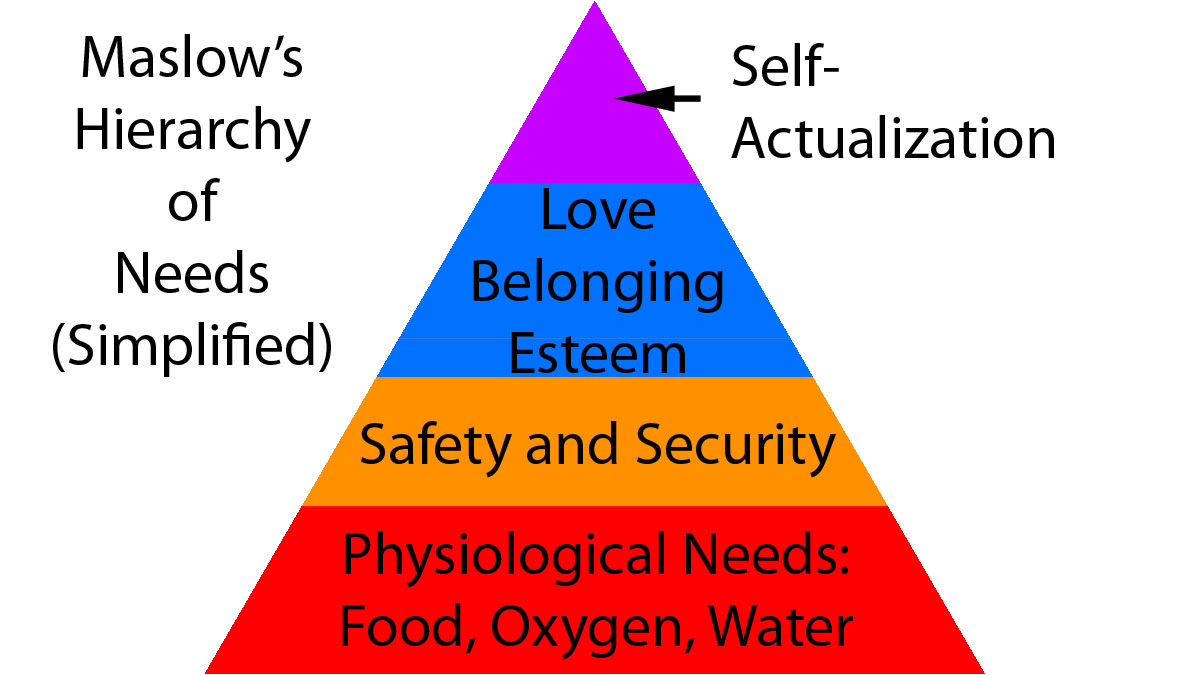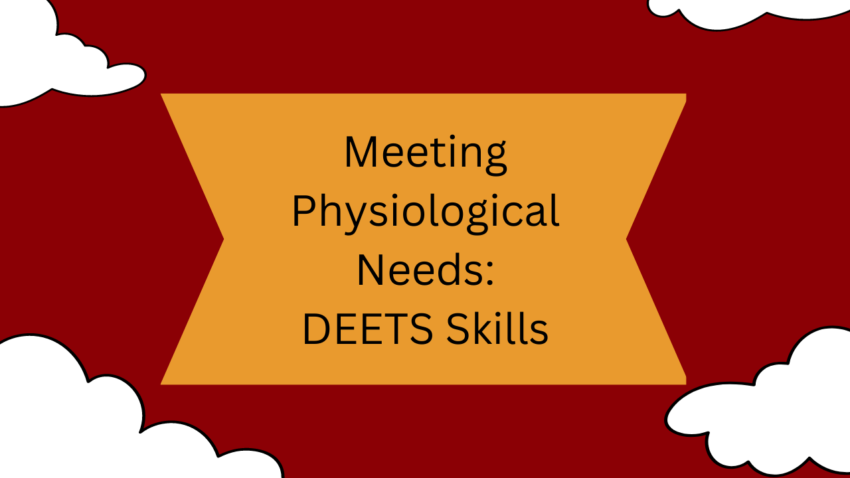The DEETS Skills are the core of our ability to recognize when our most basic needs aren’t being met. This mnemonic can help you remember to check yourself when your emotions go awry, and identify which needs you can address to quickly change your mood.
DEETS
When you are having trouble identifying your emotions, or your emotions are too strong or not strong enough, a great place to start is to check your DEETS.
- Drinking
- Eating
- Exercising
- Toileting
- Sleeping
These five needs are the core of the base layer of Maslow’s Hierarchy of needs. If you are hungry, thirsty, tired, need to use the bathroom, or aren’t getting enough exercise, your body and brain will start to act in ways that make it difficult to manage your emotions.
The Slogan That Says Everything: “You’re Not You When You’re Hungry
There’s a reason ads like the Snicker’s series in the above video were so relatable. Everyone from athletes to couch potatoes knows what it’s like to not feel like yourself when you’re hungry, or to have a coworker who becomes difficult to deal with right before lunch. Any of our DEETS can have this affect, not just hunger. It may be more socially acceptable to talk about hunger, or perhaps it’s just more marketable. Either way, if your needs in the DEETS category aren’t being met, you may not feel (or act) like yourself.
Drinking
If you’re not drinking enough, try adding more delicious beverages to your day, or try drinking small amounts of water more often. Since your body can filter water out of your system within 5 minutes, you may need to change the way you drink in order to stay hydrated. If you’re drinking large quantities once or twice a day, you probably find you need to use the restroom not long after, and all the water you drank goes down the drain, both physically and metaphorically.
Eating
Food can be hard to manage. Planning, shopping, cooking, and other preparation all take time, and we often resort to convenience to solve the problem. In order to improve your eating habits, here are some key things to keep in mind.
- Eat meals spread out throughout the day.
- Eat meals at similar times each day.
- Eat similar meals for breakfast each day.
We need to spread our meals out in order to give our body sustained energy. Eating at the same times every day lets our body get into a rhythm that relies on the routine to inform how it uses energy. And eating the same basic breakfast each day extends this routine to tell your body how much (and what kind of) food to expect. Eating a similar lunch and dinner is also beneficial. This doesn’t mean to eat the exact same food every day. Rather, have about the same number of calories for each lunch, and have your biggest proteins, carbs, vegetables, and fats at similar times, so your body will give you cravings less often.
Exercising
You don’t need to run every day to be healthy. You don’t even need to break a sweat every day. All you need to do is move enough to get your body to produce endorphins. These endorphins improve your mood (they are a Happiness chemical), but they also clear stress hormones, which is essential if you’re going to recover from daily stressors. You can’t rest enough in one weekend to make up for five days of stress, but 10 minutes of daily exercise can make all the difference. If you aren’t sure what kind of exercise is right for you, as your physician.
Toileting
Despite the social taboo which dictates we don’t talk about our experiences in the bathroom, we need to be aware of our toileting habits to understand our needs. If we need to go—and this can be urination, a bowel movement, or menstrual care—our brain isn’t going to give us the energy to focus on other things. If you’ve ever tried to have a conversation with a kid while they did the potty dance, you will know how futile it can be to try to focus when you’ve got to head to the toilet.
As a side note, if you’re putting off the toilet to have a conversation, or to finish a meeting, stop doing that. When we don’t prioritize our needs, our body will try to get creative in order to get our attention. Also, people can tell. It might feel silly to excuse yourself to the restroom, but it comes off as much less professional to be distracted when someone is trying to have an important conversation with you.
Sleeping
The first thing to remember about sleeping: We spend more time doing this than any other activity in our lives. Between one-third and two-fifths of our lives is invested in resting and recovering. If we invest in this activity, prioritize our wellness in relation to our sleep, and generally communicate to our body that we take sleep seriously, we can get better sleep, and reduce problems in many areas of our lives that we might not even relate to sleep.
For example, I have had clients who suffered from migraines, insomnia, narcolepsy, and even seizures, all of who had reduced symptoms when they altered their sleep schedule and introduced “sleep hygiene”. By sleeping at the same time every night, for the same amount of time, they managed to convince their brains that rest was a predictable activity, and that they could meet this need that left their brain feeling unsafe for so long.
If you’re worried about your sleep, you can always consult your physician, or see a sleep specialist. We will also have a series on sleep hygiene coming up, so keep an eye out for that.

TL;DR
By addressing our needs related to drinking, eating, exercising, toileting, and sleeping, we can fulfill our biological need to care for ourselves as depicted in the foundation of Maslow’s Hierarchy. Stay tuned for more videos coming soon that give specific advice to help you address each of the DEETS.
Thanks again for stopping by, and remember to be kind to yourself and others.

